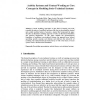1404 search results - page 2 / 281 » Modeling and Simulating Work Practice: A Method for Work Sys... |
WSC
2007
13 years 7 months ago
2007
We present the basic concepts of experimental design, the types of goals it can address, and why it is such an important and useful tool for simulation. A well-designed experiment...
CONTEXT
2007
Springer
13 years 11 months ago
2007
Springer
Current modeling approaches in the field of learning and work resemble the notion of workflows and hence fall short in describing the situated and socially mediated nature of pract...
CSCW
2006
ACM
13 years 11 months ago
2006
ACM
This paper argues that the design of remote help-giving systems should be grounded in articulation work and the methodical ways in which help-givers and help-seekers coordinate th...
HICSS
2009
IEEE
13 years 9 months ago
2009
IEEE
Creativity as modeled using the recluse genius paradigm fails to recognize the necessity and value of the collaborative aspects involved. Enhancing the creative output of teams wi...
ITS
2010
Springer
13 years 10 months ago
2010
Springer
The traditional, well established approach to finding out what works in education research is to run a randomized controlled trial (RCT) using a standard pretest and posttest desig...

